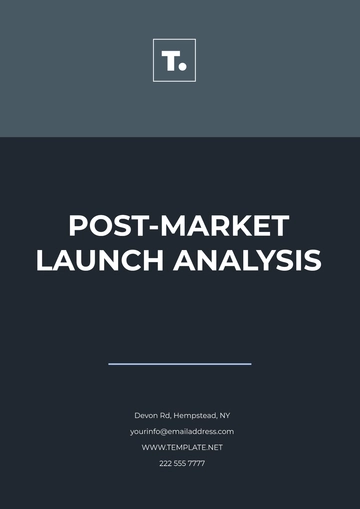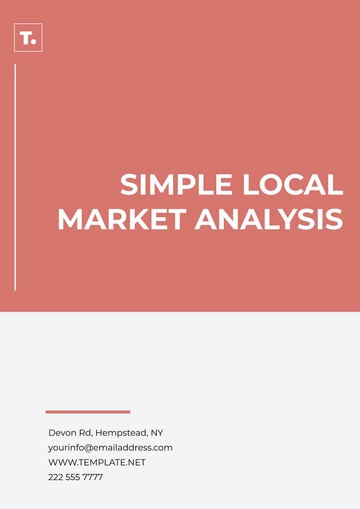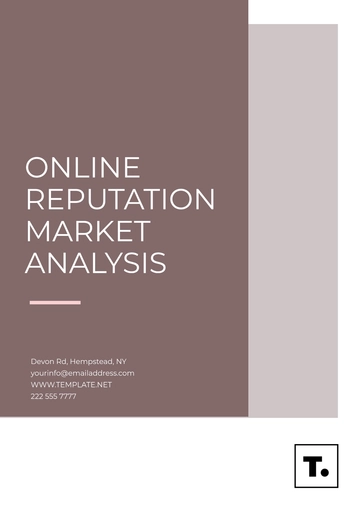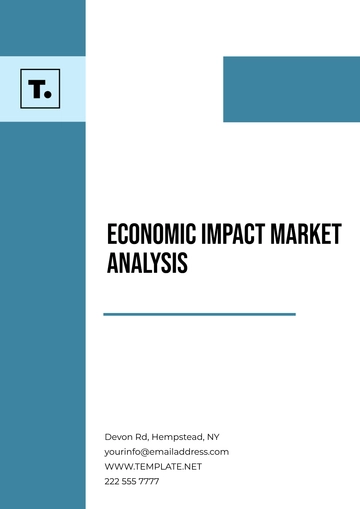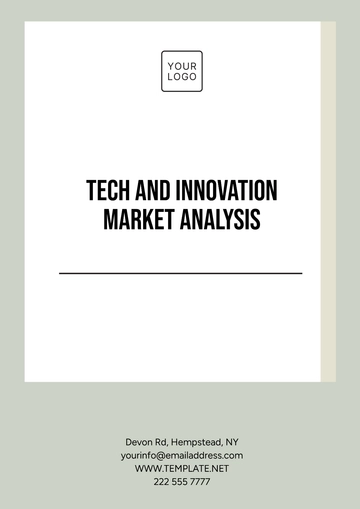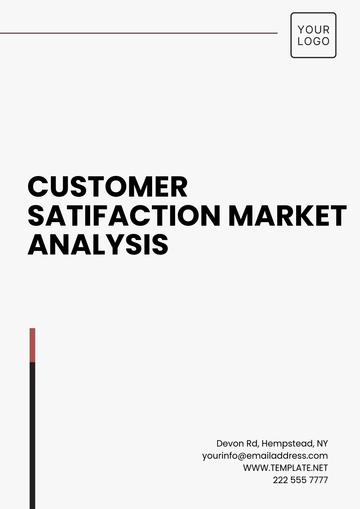Free Travel Agency Market Research Analysis
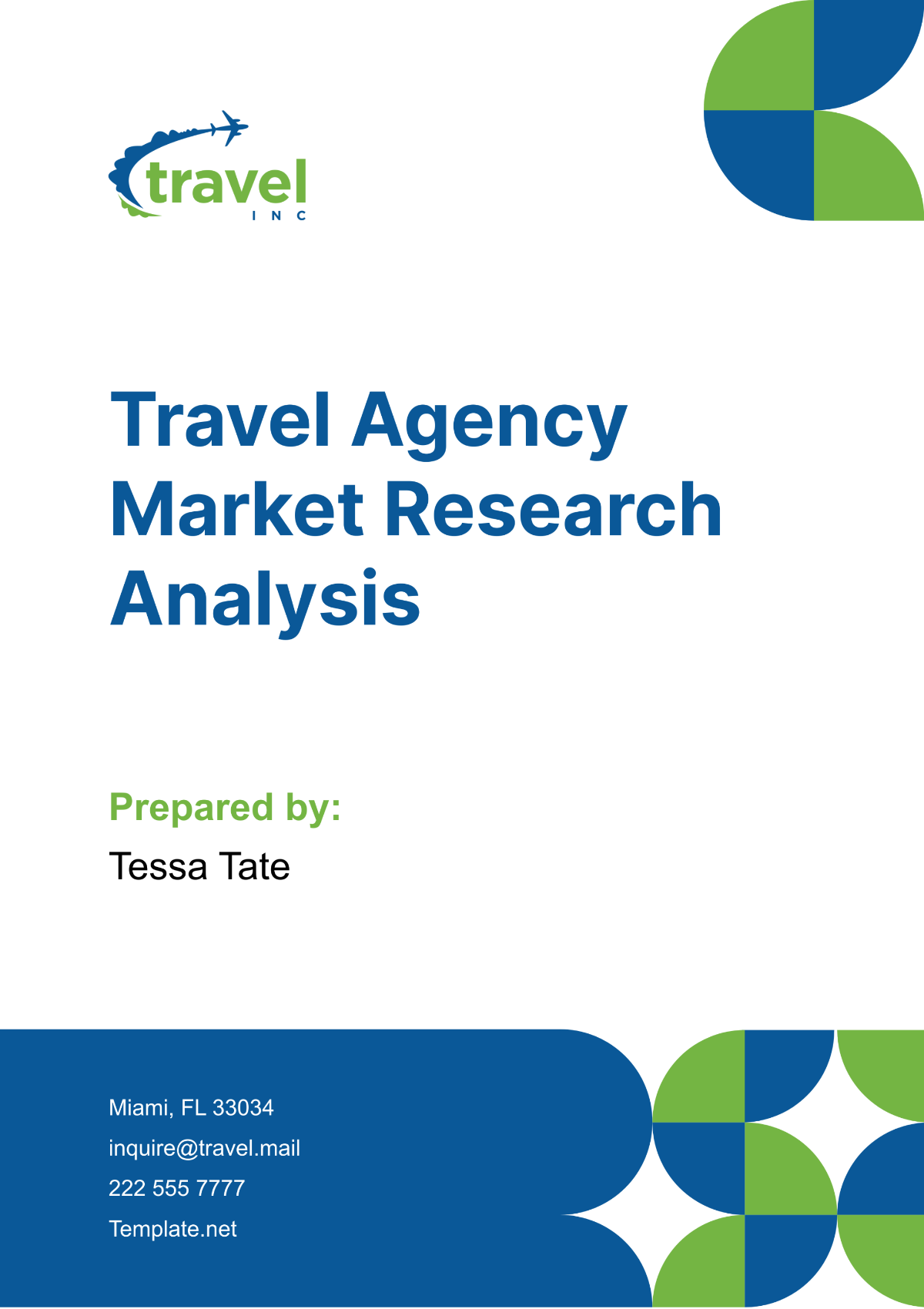
I. Executive Summary
A. Overview
Purpose of the Market Research Analysis
[Your Company Name] conducted a comprehensive market research analysis of the travel agency industry to provide insights into market trends, customer preferences, competitive landscape, and growth opportunities. The analysis aimed to assist stakeholders in making informed decisions to capitalize on emerging trends and drive business growth.
Key Findings
[Your Company Name] identified several key findings:
Increasing demand for personalized travel experiences, with [89%] of respondents expressing a preference for customized itineraries.
Growing adoption of online booking platforms, with [70%] of travelers booking their trips online in the past year.
Emerging trend of sustainable and eco-friendly travel options, with [78%] of respondents indicating a willingness to pay a premium for environmentally responsible travel.
Intense competition from online travel agencies (OTAs) and niche travel providers, with [94%] of respondents considering OTA platforms for their travel bookings.
Recommendations
Based on the findings, [Your Company Name] recommends the following strategies:
Enhance personalized travel packages to cater to diverse customer preferences, leveraging data analytics and customer feedback.
Invest in user-friendly online booking platforms with advanced features such as virtual tours, real-time availability, and secure payment options.
Incorporate sustainable travel options into service offerings, partnering with eco-conscious suppliers and promoting responsible tourism practices.
Strengthen partnerships with local businesses and destination management organizations (DMOs) to differentiate from OTAs and provide authentic, immersive travel experiences.
II. Introduction to the Travel Agency Industry
A. Industry Overview
Market Size and Growth
1.1 Current Market Size: The global travel agency industry is valued at approximately [$2 trillion], with a compound annual growth rate (CAGR) of [90%] projected over the next five years.
1.2 Projected Market Growth Rate: The market is expected to reach [$5 trillion] by [Year], driven by increasing disposable income, rising global tourism, and growing demand for experiential travel.
Market Segmentation
[Your Company Name] analyzes the travel agency industry based on the following segments:
Segment | Description |
|---|---|
Leisure Travel | Includes vacations, family trips, and recreational travel experiences. |
Business Travel | Encompasses corporate travel, meetings, incentives, and conferences (MICE). |
Adventure Travel | Focuses on outdoor activities, adventure sports, and exploration journeys. |
Others | Includes niche segments such as luxury travel, eco-tourism, and group tours. |
B. Industry Trends
Personalized Travel Experiences
Travelers increasingly seek personalized travel experiences tailored to their interests, preferences, and lifestyles.
[Your Company Name] identifies a growing demand for customizable itineraries, unique accommodations, and authentic cultural experiences.
Online Booking Platforms
The proliferation of internet access and smartphone penetration has fueled the popularity of online booking platforms.
[Your Company Name] observes a shift towards digital channels for travel bookings, with travelers preferring the convenience of online platforms for researching, planning, and booking their trips.
Sustainable Travel Options
Environmental consciousness and sustainable travel practices are gaining traction among consumers.
[Your Company Name] notes an increasing preference for eco-friendly accommodations, responsible tour operators, and carbon-neutral travel experiences.
III. Market Analysis
A. Customer Segmentation
Demographic Segmentation
1.1 Age Group
Age Group | Description |
|---|---|
18-25 | Millennials and Gen Z travelers |
26-40 | Young professionals and couples |
41-60 | Middle-aged travelers and families |
60+ | Seniors and retirees |
1.2 Income Level
Income Level | Description |
|---|---|
Low Income | Budget-conscious travelers |
Middle Income | Affluent middle-class travelers |
High Income | Luxury travelers and High Net Worth Individuals (HNWIs) |
1.3 Geographic Location
Geographic Region | Description |
|---|---|
North America | US, Canada, Mexico |
Europe | UK, Germany, France, Italy, Spain |
Asia-Pacific | China, Japan, Australia, South Korea |
B. Competitive Analysis
Key Competitors
1.1 Online Travel Agencies (OTAs)
OTAs such as Expedia, Booking.com, and Airbnb dominate the online travel market, offering a wide range of accommodations, flights, and travel experiences.
1.2 Traditional Travel Agencies
Traditional brick-and-mortar agencies, including [Your Company Name], continue to play a significant role in the travel industry, providing personalized service and expertise.
1.3 Niche Travel Providers
Niche travel providers focus on specialized segments such as adventure travel, luxury cruises, eco-tourism, and wellness retreats, catering to specific traveler interests and preferences.
Competitive Strategies
2.1 Pricing Strategies
[Your Company Name] adopts dynamic pricing strategies to remain competitive, offering seasonal discounts, promotional packages, and exclusive deals to attract customers.
2.2 Product Differentiation
[Your Company Name] distinguishes itself through unique travel experiences, curated itineraries, and personalized service, emphasizing quality over quantity.
2.3 Marketing and Promotional Activities
[Your Company Name] leverages digital marketing channels, social media influencers, and strategic partnerships to increase brand visibility, engage customers, and drive bookings.
IV. Consumer Behavior Analysis
A. Booking Preferences
Online Booking vs. Offline Booking
[Your Company Name] observes a growing preference for online booking platforms due to their convenience, accessibility, and extensive range of options.
While some customers still prefer traditional offline booking methods for complex itineraries or personalized assistance, the majority opt for the speed and ease of online transactions.
Factors Influencing Booking Decisions
2.1 Price
Price remains a significant factor influencing booking decisions, with budget-conscious travelers prioritizing affordability and value for money.
2.2 Convenience
Convenience is paramount, with travelers seeking seamless booking experiences, flexible cancellation policies, and 24/7 customer support.
2.3 Reputation and Reviews
Trust and reliability play a crucial role, as travelers rely on online reviews, ratings, and recommendations from fellow travelers to make informed decisions.
V. Growth Opportunities
A. Emerging Markets
Asia-Pacific
The Asia-Pacific region presents significant growth opportunities for [Your Company Name] due to its expanding middle class, rising disposable income, and increasing appetite for travel.
Key markets such as China, Japan, India, and Southeast Asian countries offer immense potential for outbound and inbound tourism, with a growing demand for diverse travel experiences.
Latin America
Latin America is emerging as a promising market for [Your Company Name], fueled by improving infrastructure, economic stability, and a growing tourism industry.
Countries like Brazil, Mexico, Argentina, and Colombia attract travelers with their rich cultural heritage, natural landscapes, and vibrant cities, offering opportunities for expansion and partnership.
Middle East and Africa
The Middle East and Africa region offer untapped potential for [Your Company Name] to capitalize on growing tourism trends, infrastructure development, and government initiatives to promote tourism.
Destinations such as the United Arab Emirates, South Africa, Kenya, and Morocco are experiencing a surge in tourism arrivals, driven by diverse attractions, luxury hospitality, and cultural experiences.
B. Product Diversification
Adventure Travel Packages
[Your Company Name] can expand its portfolio to include adventure travel packages catering to thrill-seekers, outdoor enthusiasts, and nature lovers.
Activities such as hiking, trekking, safari tours, water sports, and wildlife encounters appeal to adventurous travelers seeking adrenaline-pumping experiences.
Wellness and Spa Retreats
Wellness tourism is on the rise, with travelers prioritizing health, relaxation, and rejuvenation during their vacations.
[Your Company Name] can collaborate with wellness resorts, spa retreats, and holistic wellness centers to offer wellness-focused travel packages, including yoga retreats, meditation workshops, and wellness cruises.
Cultural and Educational Tours
Cultural tourism offers immersive experiences that allow travelers to explore local traditions, cuisine, art, and history.
[Your Company Name] can curate cultural and educational tours to iconic landmarks, UNESCO World Heritage sites, and off-the-beaten-path destinations, providing travelers with enriching and educational experiences.
C. Technological Advancements
Artificial Intelligence (AI) in Travel Planning
[Your Company Name] can leverage AI-powered travel planning tools and chatbots to enhance customer service, personalize recommendations, and streamline the booking process.
AI algorithms analyze customer data, preferences, and behavior to offer tailored travel suggestions, itinerary suggestions, and real-time assistance.
Virtual Reality (VR) Travel Experiences
VR technology enables [Your Company Name] to provide immersive virtual travel experiences, allowing customers to explore destinations, hotels, and attractions from the comfort of their homes.
VR tours, 360-degree videos, and virtual reality headsets offer a preview of travel experiences, helping travelers make informed decisions and visualize their trips before booking.
Blockchain for Secure Transactions
Blockchain technology enhances transparency, security, and trust in travel transactions, including bookings, payments, and loyalty programs.
[Your Company Name] can adopt blockchain solutions to prevent fraud, streamline cross-border payments, and create decentralized travel platforms that empower customers and suppliers.
VI. Challenges and Risks
A. Regulatory Compliance
[Your Company Name] faces regulatory challenges related to licensing, permits, taxes, and compliance with industry regulations and standards.
Navigating complex regulatory environments across different jurisdictions requires legal expertise, resources, and diligence to ensure compliance and mitigate risks.
B. Economic Volatility
Economic fluctuations, currency exchange rates, and geopolitical uncertainties impact consumer spending, travel demand, and business operations.
[Your Company Name] must monitor economic indicators, geopolitical developments, and market trends to anticipate risks, adapt strategies, and mitigate financial volatility.
C. Cybersecurity Threats
Cybersecurity threats such as data breaches, ransomware attacks, and phishing scams pose risks to [Your Company Name]'s online platforms, customer data, and business continuity.
Implementing robust cybersecurity measures, encryption protocols, and employee training programs is essential to safeguard sensitive information, protect against cyber threats, and maintain customer trust.
VII. Conclusion
[Your Company Name] concludes that the travel agency industry offers promising opportunities for growth and innovation, despite facing various challenges and risks. By leveraging emerging trends, expanding into new markets, diversifying product offerings, and embracing technological advancements, travel agencies can stay competitive and meet the evolving needs of travelers. However, it is crucial for [Your Company Name] to address regulatory compliance, economic volatility, and cybersecurity threats to ensure sustainable growth and long-term success in the dynamic travel industry.
- 100% Customizable, free editor
- Access 1 Million+ Templates, photo’s & graphics
- Download or share as a template
- Click and replace photos, graphics, text, backgrounds
- Resize, crop, AI write & more
- Access advanced editor
Conduct thorough market research with Template.net's Travel Agency Market Research Analysis Template. This customizable document provides a structured framework for analyzing market trends, competitor analysis, customer preferences, and industry insights relevant to your travel agency. Crafted with clarity and functionality, it helps inform strategic decisions and marketing efforts. Editable in our AI Editor Tool for seamless customization and integration into your agency's market research processes.




